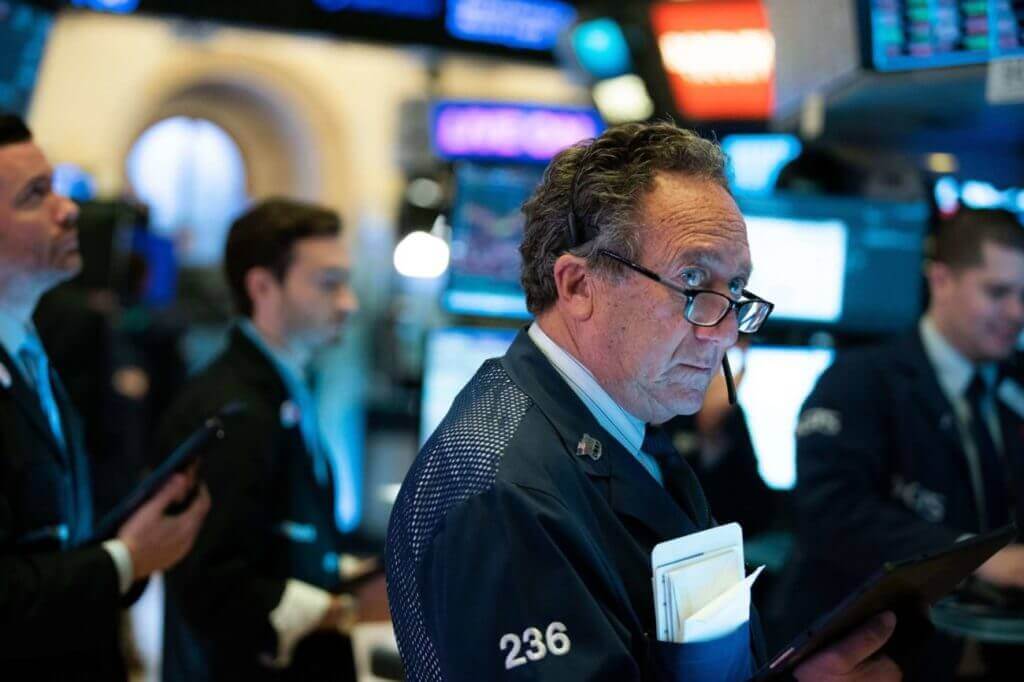The U.S. Stock Market Is Getting Ahead of Itself – This Graph Proves It

Investors are much more excited than stock market analysts. | Image: Jeenah Moon/Getty Images/AFP
- Investors should be cautious in weighing up the risk and reward of piling into the stock market.
- The economy can’t support such an irrational market much longer.
- Analysts worry investors have become too optimistic.
This chart, which depicts the stages of a bubble, has become well-known among those investing in the U.S. stock market.

It explains the psychology behind market bubbles and has played out several times in history. Its image can be seen during the bitcoin bubble burst as well as the dot-com bubble of the ’90s. But what about today’s stock market? Are we following that trajectory, or was the March decline simply a large-scale correction?
Another chart, this time depicting investor optimism, holds the answer.

According to data compiled by MagnifyMoney, 1 in 5 investors see the stock market recovering fully by October . Over half of the investors surveyed think the market will rebound within a year. Only 15% had the sense to admit they don’t know.
Stock Market Bubble Inflated by Optimism

Looking at the stock market bubble chart, it appears we’re planted firmly in the “return to ‘normal'” phase. That’s when investors cheer on a legless rally, thinking it’s the market digging itself out of a correction.
As investors shift their focus toward potential vaccines and economies re-opening, they’ve forgotten one critical factor: the economy. Eventually, the stock market has to reflect what’s happening in the real economy because investors will have to accept what’s happening in the real economy.

When that happens, the stages of fear, capitulation, and despair will be upon us.
There’s no doubt that a vaccine would speed up the pace of economic recovery exponentially, but we’re still months away from that kind of discovery. Also, it could never happen .
Vaccine or not, investors are too optimistic about how long the pandemic will weigh on markets.
Analysts Caution Against Rushing In
I’m not the only one shaking my head as investors pile into the stock market. ING strategists say investors have become fixated on a 2021 recovery. The bank cautioned that even big names like Amazon (NASDAQ:AMZN) have been reluctant to issue guidance— that’s a red flag considering how far the market’s rally has come.
In uncertain times like these, higher earnings expectations or lower valuations may be needed to keep equity markets supported. We err towards the latter.
Deutsche Bank CEO Christian Sewing echoed that sentiment on Tuesday , saying the economic consequences of these shutdowns haven’t fully revealed themselves.
Yes, markets repriced, but in my personal view the underlying assumption for this recovery are a bit too optimistic
S&P 500 Bursts Above Key Level

On Tuesday, traders cheered as the S&P 500 moved above its 200-day moving average for the first time since early March. Many cautioned that if the index languishes between its 50-day moving average and its 200-day moving average for too long, a major downside could be coming.
But according to Sundial Capital Research analyst Jason Goepfert, even today’s bust above 3000 isn’t enough to put a bullish spin on the index’s future. His research shows that despite that milestone, history shows it tends to deliver a decline over the next six months.
The trouble is basically that buyers haven’t shown enough oomph to make any progress lately. When that happens during down trending markets like we’ve been in, with a protracted stretch near but below the 200-day average, it has indicated larger problems and that has almost always meant further weakness ahead
Risk isn’t Worth the Reward
Famed investor Warren Buffett’s investment principle is to be greedy when the market is fearful and fearful when the market is greedy. The irrational exuberance in today’s market is undoubtedly greed.

As valuations climb closer to their pre-pandemic levels, investors have to ask themselves whether the risk is worth the reward. Can stocks push to all-time highs with unemployment in the double digits for the next year? That seems very unlikely, and by most accounts, unemployment will remain high through 2021 .
At some point, the switch will flip, and investors will realize, as they have in every bubble in history, that the situation has changed.
Disclaimer: This article represents the author’s opinion and should not be considered investment or trading advice from CCN.com. As of this writing Laura Hoy did not hold a position in any of the aforementioned securities.